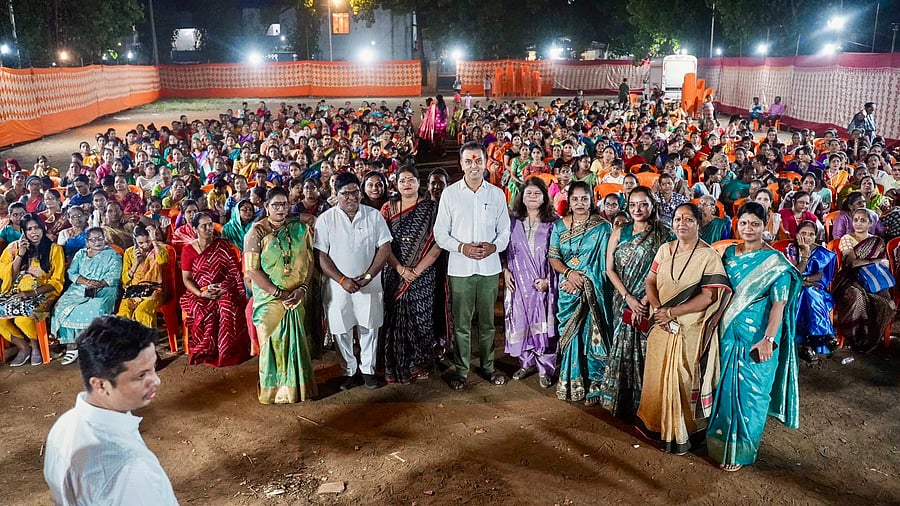
Milind Deora with women who purportedly used money from the Ladki Bahin Yojana - put in place by the Eknath Shinde Maharashtra govt - to start their small business ventures.
Credit: X/@milinddeora
Many state governments have, over time, discovered the magic mantra that reaps benefits at election time: cash transfers to women. Most analysts have hailed these transfers as decisive. They have resulted in the formation of an electoral constituency.
Undeniably small sums of money give to women a certain degree of autonomy, and protect households from sinking into absolute deprivation. Whether such moves contribute to the consolidation of democracy is, however, debatable.
Cash transfers shift attention from the big questions that democracy asks. For one, can democracy flourish in a climate of extreme inequality as we see in India. A small segment of society commands a major share of resources.
Analysts have begun to describe India as an oligarchy, where a few obscenely wealthy families control not only the economy, but also the political class. The majority of Indians eke out bare life on the margins of society, of the economy, and of politics.
This is not new. In 1958, in the film Phir Subah Hogi, directed by Ramesh Saigal, Raj Kapoor lip-syncs a song sung by Mukesh, written by Sahir Ludhianvi and composed by Khayyam. The song is an acerbic take-off on the famous poem written by Iqbal ‘sare jahan se accha hindustan hamara’. The song in the film rues, ‘Chino-Arab Hamara, Hindustan Hamara/rehne ko ghar nahi hai/sara jahan hamara’. (China, the Arab world and India are ours. We do not have a house to live in, yet the whole world is ours).
By now Indian democracy should have been strengthened, and the ruling class become more sensitive to the rights of citizens. But rulers prefer to hand out Rs 2,500, and avoid the pressing need for equality.
We cannot claim to be a democracy when our political class dispenses relatively small sums of money to women, and ignores massive unemployment, children whose lives are blighted by malnutrition, hunger, agrarian distress, and the woeful conditions of shanty towns which house the urban poor. Instead of creating jobs, of ensuring that every child is enrolled in well-run schools and does not have to beg at streetlights, of seeing that everyone is given the right to health, and that the poor do not have to exhibit diseased limbs when they beg, governments prefer to offer a pittance to women. This is, in politically coarse but appropriate terms, bribery.
These transfers create a rankly individualist society where people are given a pittance instead of social and economic rights. In the history of democracy, economic and social rights are seen as indispensable preconditions for political and civil rights. We cannot vote as independent citizens who choose candidates based on their performance, if we are dependent upon this or that political party for small sums of money. More significantly, economic and social rights to education, to health, to housing, to remunerative employment, and basic preconditions of a good life, are indivisible and collective goods.
These rights in established democracies have been claimed by citizens as their rightful due. The process of claiming these rights has created citizenship. Citizens see the state as obliged to provide them with the primary conditions of a life led with dignity.
Nineteenth century German philosopher Karl Marx has told us long ago that the essence of human beings is their capacity to labour. Individuals realise this essence through intellectual and manual labour. The absence of remunerative employment, and uncertain and precarious jobs in the informal economy diminishes individuals. It strips them of their dignity as human beings who have the right to be treated in a certain way, and the right not to be treated inhumanly. The grant of a pittance to women may be a supplement to wages, but it is not a substitute. Unfortunately, our political class has reduced democracy to elections, and at election time anything goes.
Democracies are premised on the notion of popular sovereignty. Citizens approach the State as the bearer of rights. Grants of personalised sums of money, or a bag of grain that carry a photograph of the leader, creates patrimonial relations between the politician and the citizen. The citizen no longer remains a bearer of rights; they become a recipient of largesse dished out of the tax-payers money. Democracy is compromised. This is not democracy; it amounts to personalised authoritarianism. And elections that are supposed to be the linchpin of democracy because they enable us to choose our own rulers, become a hollow ritual.
We reward rulers not because they have upheld our rights as citizens, but because they have made us subservient through cash transfers. Patrimonial relations between lords and serfs that characterised feudalism continue in new ways and rites in democracy. Rights have been replaced by charity.
Finally, the basic premise of democracy is that of constant critique of the way power is held and exercised by a political class elected by the people. ‘The condition upon which God hath given liberty to man is eternal vigilance’ said Irish statesman John Philip Curran.
The implication is that we should be ready to engage with, mobilise, and agitate against a political class which, along with oligarchs, wield enormous power over our lives. Indian citizens cannot do this if their votes and their loyalty have been bought for a fistful of currency even before they vote. This is the other side of cash transfers to women.
(Neera Chandhoke is former professor of political science, Delhi University. X: @ChandhokeNeera.)
Disclaimer: The views expressed above are the author's own. They do not necessarily reflect the views of DH.